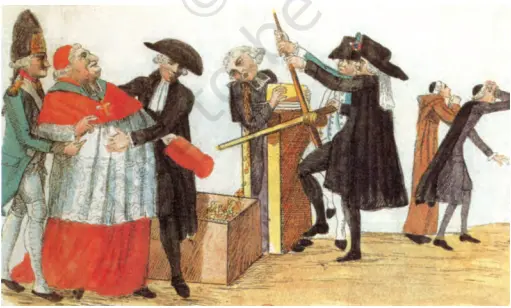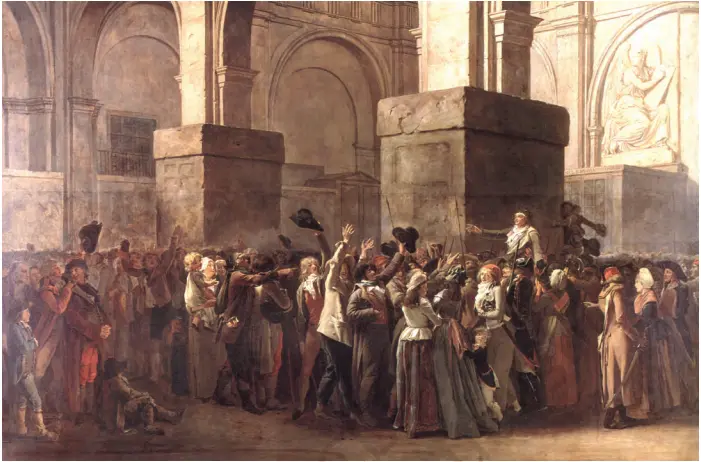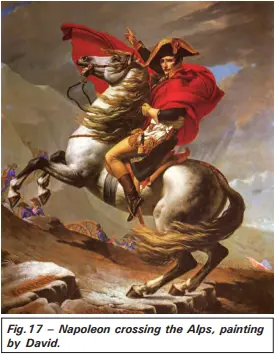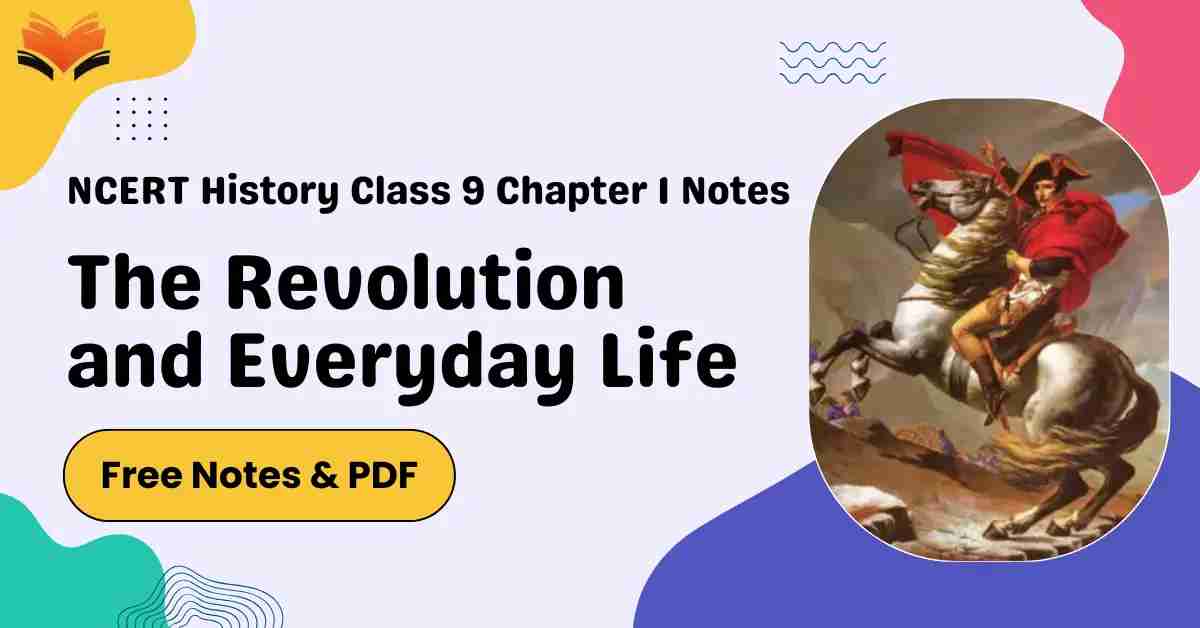The Revolution and Everyday Life – Concept & Notes PDF
Topic & sub-topics covered: The Revolution and Everyday Life and MCQs Questions: The French Revolution (All single detail notes are exam-oriented).
We have discussed in-depth and exam-oriented pointers that can be asked in the board exam of class 9th about the “The Revolution and Everyday Life” from the NCERT History notes for class 9th chapter 1st “The French Revolution“.
Download the NCERT History for Class 9th Chapter 1 The French Revolution Notes PDF
NCERT History for Class 9th Chapter 1_ The French Revolution Notes & MCQ’s Question-Answer
Hey Class 9! The French Revolution chapter topic “the Revolution and Everyday Life” giving you a headache? Yeah, been there. So many names, dates, and those confusing terms like Estates General and Reign of Terror – it’s a lot, right?
When I first read this chapter, I honestly had no clue what was going on. Like… why were people storming a prison? Who even was Louis XVI? But once someone explained it in simple language, it finally clicked. That’s exactly why I made these notes – to help you get it without drowning in textbook blah-blah.
These notes are short, straight to the point, and written like a friend explaining stuff – not some robotic lecture. Whether you’re cramming before an exam (we’ve all done it) or just revising bit by bit, the Revolution and Everyday Life class 9 Notes PDF got your back. And yep, it works offline too – because let’s face it, your Wi-Fi bails right when you need it most. Oh, and guess what? You can download it right below. Go on, grab it. No stress.
The Revolution and Everyday Life

1. Revolutionary Social Reform by Jacobins:
- One of the most radical social reforms of the Jacobin regime was the abolition of slavery in French colonies.
- This reform reflected the ideals of liberty, equality, and fraternity extended beyond mainland France.

2. Importance of Caribbean Colonies:
- Major French colonies in the Caribbean were:
a. Martinique
b. Guadeloupe
c. San Domingo - These colonies were key producers of:
a. Tobacco
b. Indigo
c. Sugar
d. Coffee
3. The Labour Crisis & Slave Trade:
- European reluctance to work in faraway colonies led to a severe labour shortage on plantations.
- This labour gap was filled through the triangular slave trade between: Europe → Africa → Americas
- The slave trade began in the 17th century.
- French merchants from Bordeaux and Nantes sailed to Africa and:
a. Bought slaves from local African chieftains
b. Slaves were branded, shackled, and packed on ships
c. Voyage to the Caribbean took three months - Once in the Caribbean, the slaves were sold to plantation owners.
- The use of slave labour allowed plantation owners to meet high demands in European markets for sugar, coffee, and indigo.
- Port cities like Bordeaux and Nantes became economically prosperous due to the slave trade.
4. French Attitude Towards Slavery:
- In the 18th century, there was little criticism of slavery in France.
- The National Assembly debated whether the Rights of Man applied to colonial people, but:
a. No law was passed
b. Fear of businessmen’s opposition who profited from the trade
5. Slavery Abolished & Reintroduced:
- In 1794, the Convention finally abolished slavery in all French overseas colonies.
- However, this was a temporary reform.
- In 1804, Napoleon Bonaparte reintroduced slavery, reversing the earlier law.
- Plantation owners believed freedom included the right to own slaves for economic gain.
6. Final Abolition:
- Slavery was permanently abolished in all French colonies in 1848.
Conclusion – Impact of the French Revolution and Napoleon

1. Napoleon Bonaparte’s Rise and Rule:
- In 1804, Napoleon Bonaparte crowned himself Emperor of France.
- He began a military campaign to conquer neighboring European countries.
- Napoleon dispossessed old ruling dynasties and placed his own family members on the thrones of newly created kingdoms.
- He saw himself as a moderniser of Europe, not just a conqueror.
2. Reforms Introduced by Napoleon:
- Napoleon introduced progressive laws, including:
a. Protection of private property
b. Uniform system of weights and measures (using the decimal system) - These reforms were initially welcomed by many across Europe who viewed him as a liberator.
3. Change in Public Perception:
- Over time, Napoleonic armies were seen as invaders, not liberators.
- Napoleon was defeated at the Battle of Waterloo in 1815, marking the end of his reign.
4. Lasting Impact of Napoleon’s Rule:
- Despite his defeat, Napoleon’s reforms spread revolutionary ideas such as:
a. Liberty
b. Equality
c. Modern laws - These ideas continued to inspire Europe long after Napoleon was gone.
5. Global Legacy of the French Revolution:
- The most important legacy of the French Revolution was the idea of:
a. Liberty
b. Democratic rights - These ideas spread throughout Europe in the 19th century, leading to the:
a. Abolition of feudal systems
b. Rise of nationalist movements - Colonised nations began to reinterpret liberty as freedom from colonial rule and fought for sovereignty.
6. Impact on Indian Thinkers:
- Tipu Sultan (Mysore ruler) and Raja Rammohan Roy were influenced by the revolutionary ideas from France.
- These thinkers adapted the French ideals in their resistance and reform movements.
7. Box 2: Rammohan Roy’s Response to French Revolution:
- Raja Rammohan Roy was deeply inspired by:
a. The French Revolution (1789)
b. The July Revolution (1830) - He was so enthusiastic that on his voyage to England, he:
a. Insisted on visiting French warships
b. Even though he was injured, he wanted to see the ships flying the revolutionary tri-colour flag. - His excitement showed how far French revolutionary ideas had travelled, influencing thinkers even in colonial India.
Next & Previous Topics of NCERT/CBSE History Class 9 Chapter 1: The French Revolution
MCQs on NCERT History Class 9 Chapter 1 Topic – The Revolution and Everyday Life
Here are the top exam-oriented MCQ-type questions on “The Revolution and Everyday Life” that you should prepare for your CBSE or state board exams:
Question 1. Which year marked the abolition of censorship in France?
a) 1787
b) 1788
c) 1789
d) 1791
Answer: c) 1789
Question 2. What was the role of censors under the Old Regime in France?
a) Promote revolutionary literature
b) Translate documents into French
c) Approve all written and cultural material before publication
d) Train writers and dramatists
Answer: c) Approve all written and cultural material before publication
Question 3. What did the Declaration of the Rights of Man and Citizen proclaim regarding expression?
a) It banned religious writings
b) It allowed kings to control the press
c) Freedom of speech and expression as a natural right
d) Citizens could only speak in French
Answer: c) Freedom of speech and expression as a natural right
Question 4. What was the impact of abolition of censorship in France?
a) Rise in dictatorship
b) Flooding of towns with newspapers and books
c) Decline in literacy
d) Increase in royal propaganda
Answer: b) Flooding of towns with newspapers and books
Question 5. How did revolutionary ideas reach rural France?
a) Through word of mouth only
b) Through travelling salesmen
c) Through printed books and pamphlets
d) Through speeches by kings
Answer: c) Through printed books and pamphlets
Question 6. What was one way common people could understand abstract ideas like liberty and justice?
a) Through political textbooks
b) Through parliamentary debates
c) Through plays, songs, and festive processions
d) Through military training
Answer: c) Through plays, songs, and festive processions
Question 7. Why were plays and songs effective during the French Revolution?
a) They replaced schools
b) They helped people identify with revolutionary ideas
c) They were used to celebrate monarchy
d) They entertained only the upper class
Answer: b) They helped people identify with revolutionary ideas
Question 8. What does the abolition of censorship indicate about the French Revolution?
a) It discouraged free thinking
b) It promoted liberty and freedom of thought
c) It supported only elite writers
d) It restricted communication
Answer: b) It promoted liberty and freedom of thought
Question 9. Who declared himself Emperor of France in 1804?
a) Robespierre
b) Louis XVI
c) Napoleon Bonaparte
d) Danton
Answer: c) Napoleon Bonaparte
Question 10. What modern reforms were introduced by Napoleon in Europe?
a) Abolished property rights
b) Introduced monarchy
c) Protection of private property and decimal system
d) Banned all foreign trade
Answer: c) Protection of private property and decimal system
Question 11. What system of measurement did Napoleon promote?
a) Binary system
b) Metric decimal system
c) Imperial system
d) Ancient Roman system
Answer: b) Metric decimal system
Question 12. Initially, Napoleon was seen as a ____ by many Europeans.
a) Tyrant
b) Religious reformer
c) Liberator
d) Monarchist
Answer: c) Liberator
Question 13. Why did people eventually turn against Napoleonic armies?
a) They stopped reforming
b) They were seen as an invading force
c) They supported feudal lords
d) They introduced slavery
Answer: b) They were seen as an invading force
Question 14. Where was Napoleon finally defeated?
a) Paris
b) Leipzig
c) Rome
d) Waterloo
Answer: d) Waterloo
Question 15. Which ideas from the French Revolution continued to inspire Europe after Napoleon?
a) Feudal privileges
b) Divine right
c) Liberty and democratic rights
d) Absolute monarchy
Answer: c) Liberty and democratic rights
Question 16. How did colonised people use the French revolutionary ideas?
a) To support colonialism
b) To demand monarchy
c) To fight for a sovereign nation
d) To welcome foreign rulers
Answer: c) To fight for a sovereign nation
Question 17. Which Indian reformer was inspired by the French and July Revolutions?
a) Swami Vivekananda
b) Tipu Sultan
c) Raja Rammohan Roy
d) Dadabhai Naoroji
Answer: c) Raja Rammohan Roy
Question 18. What event excited Rammohan Roy’s imagination in 1830?
a) Storming of the Bastille
b) French Civil War
c) July Revolution in France
d) American Independence
Answer: c) July Revolution in France
Question 19. Which revolutionary symbol did Rammohan Roy admire during his journey to England?
a) Red Cross flag
b) Royal British crest
c) Revolutionary tri-colour flag
d) Mughal imperial seal
Answer: c) Revolutionary tri-colour flag
Question 20. Which warships did Rammohan Roy insist on visiting at Cape Town?
a) British East India ships
b) Indian naval boats
c) Frigates flying revolutionary tri-colour
d) Ottoman battleships
Answer: c) Frigates flying revolutionary tri-colour

